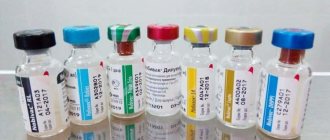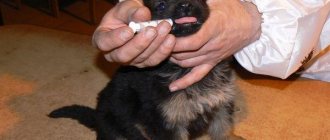Vaccinations for Chihuahuas are mandatory preventive measures. This allows you to protect your pets from infections that the animal can contract absolutely anywhere.
Many breeders of dogs of this breed prefer to ignore the recommendations of veterinarians, explaining this by the fact that the four-legged friend does not have any contact with other dogs.
In this regard, the question often arises about whether there is a need for vaccination and how to carry it out correctly without causing harm to the pet’s health.
Why is vaccination needed?
Most dog breeders are of the opinion that if their pet does not walk outside and does not come into contact with other animals, then there is no need for routine vaccination. But specialists from veterinary clinics try to convince the owner of a tiny breed otherwise as quickly as possible.
Mandatory vaccination is necessary for several reasons:
many infectious pathologies are transmitted by airborne droplets, or infection occurs through feces that a person can carry on shoes;- most diseases pose a serious threat not only to the health of the four-legged animal, but also to the human body;
- Chihuahua puppies have relatively sensitive immunity.
To ensure your pet a happy and long life, vaccination must be mandatory. Thanks to timely vaccinations, you can protect your animal from contracting diseases that pose a threat to health and life.
In modern veterinary clinics, experts advise lovers of this extravagant breed to give their animals vaccinations that will help prevent the development of the following diseases:
- viral enteritis;
- rabies;
- hepatitis of infectious nature;
- carnivore plague;
- parainfluenza;
- adenoviral infection;
- leptospirosis.
If the animal was purchased recently, and the first owner did not take care to ensure that the Chihuahua was vaccinated according to age, this should be done by the new owner.
Notes on all injections are recorded in the veterinary passport only by a doctor with the appropriate license. The name of the drug is indicated, a stamp and the signature of the veterinarian are placed.
If there is no appropriate documentary evidence of injections, then the animal will not be released abroad.
Vaccination schedule: when and what to do
Since puppies have an increased susceptibility to many infectious diseases, unlike adult dogs, they need to be provided with some protection, which will reduce the likelihood of contracting an infection of bacterial or viral origin and strengthen the immune system.
Vaccination is carried out according to the vaccination calendar established for the Chihuahua breed.
| First | 8 weeks |
| Second | 12 weeks |
| Third | 30 weeks |
| Subsequent | Every 12 months, a year after the first vaccination, for the entire subsequent life of the pet |
| Against rabies | First time a year, then every 12 months |
First
This is done when the animal reaches 2 months of age. To do this, the specialist administers two types of vaccine: DHPPI+Lepto or Nobivak Lepto .
Thanks to these drugs, it is possible to prevent the development of such dangerous pathological processes as carnivore plague, parainfluenza, enteritis and leptospirosis. Injections are given intramuscularly or injected under the skin.
The price of medicine with syringes will vary from 500 to 700 rubles. Vaccination of a Chihuahua in a clinic without the drug included in the price ranges from 300 to 500 rubles.
If the dog was purchased at 2 months of age or older, then the previous owner must be required to provide a passport with a stamp on the first vaccination.
Second
Revaccination is performed 30 days after the initial one. In this case, the veterinarian uses the same drugs, which allows you to consolidate the previously obtained results.
Third
According to the vaccination schedule, the final revaccination can be done only after the teeth have been completely renewed. (age six to seven months). Medicines – Nobivak DHPPI or Nobivak Rabies.
For rabies
According to most veterinarians, such a vaccination is recommended when the puppy is one year old, not earlier, since it is difficult to tolerate.
In most cases, the doctor prescribes the drug Eurican LR. This vaccine is active for 36 months. However, due to the fact that the disease poses a serious danger not only to the pet, but also to human health, in the future it must be done every 12 months in the spring.
Rabies vaccinations are allowed only in special veterinary clinics that have the appropriate license to provide such services..
What diseases can vaccination save you from?
Today, there are no mono-vaccines on the drug market that protect exclusively against one disease. Dogs are given complex vaccines, which is convenient, since one ampoule includes protection against the most common diseases.
If you exclude your dog from vaccinations, the animal can be affected by a number of diseases, the most common of which are:
- Rabies. The disease is serious and dangerous, both for the dog and the owner. Can be fatal. Treatment for rabies is difficult and positive dynamics are not always observed.
- Viral hepatitis. It poses a great danger to Toy Terrier puppies. For treatment, serums are prescribed that cause severe allergies and side effects.
- Plague of carnivores. The disease is very common and deadly, so getting vaccinated against this disease is very important.
- Leptospirosis. When infected with the disease, several organs of the animal are affected at once, treatment is extremely difficult.
- Bordetellosis. This infection affects the animal's respiratory system; treatment is not difficult, but medications are very expensive.
We recommend this article:
What you need to know about the timing and preparations for vaccinating dogs
How to prepare a Chihuahua for vaccination
Before you take your dog to the vet, you must meet several prerequisites:
10 days before vaccination, regardless of whether it is the first or third, the animal must be dewormed. This is explained by the fact that helminths do not allow protective antigens to have an effective effect. In addition, in this case the likelihood of developing side effects and complications significantly increases. For worms, experts recommend medications such as Procox or Drontal Plus. They can only be used in accordance with the attached instructions.- An equally important rule is measuring the body temperature of your four-legged friend. This must be done three hours before the vaccine is administered. It is strictly forbidden to vaccinate if the animal has health problems.
You need to make an appointment in advance and agree with your doctor on the day and exact time of your appointment.
Further care and possible complications
After vaccination, the toy terrier may experience drowsiness, lack of appetite, and even increased body temperature.
There is no reason to worry about this; this is a normal reaction of the body that goes away after a few days. In rare cases, individual intolerance to the drug is observed with the following severe symptoms: shortness of breath, redness of the injection site, loss of consciousness, etc. In such cases, be sure to contact your veterinarian.
Side effects and consequences
Despite their high effectiveness, the drugs can cause certain side reactions, which sometimes appear only after a few hours.
The most common include:
swelling and redness at the injection site;- slight increase in temperature indicators;
- lack of appetite;
- decreased activity;
- increased drowsiness;
- presence of pain at the injection site.
Such effects are considered safe and go away on their own within two days.
If a Chihuahua develops a mild allergy, you can give him an antihistamine - Suprastin or Diphenhydramine.
Less commonly, there may be more serious complications after vaccinations that require immediate attention to a veterinarian. Among these side effects are the development of anaphylactic shock, severe attacks of nausea and vomiting, difficulty breathing, allergic rashes, itching, swelling of the neck and muzzle.
If the puppy is lethargic
If the pet remains in a lethargic state for a long period of time, and its health does not improve, the dog must be shown to a specialist.
This reaction can occur when the vaccine is given to an animal that already has health problems. If your health deteriorates significantly, the doctor will recommend the use of special medications.
Possible consequences and reactions
In the first days after vaccination, the dog will experience a slight increase in body temperature, lack of appetite, drowsiness, and a slight lump at the injection site.
If you notice that the animal feels unwell, there are problems with the gastrointestinal tract, the Chihuahua sleeps all the time and does not react to its favorite toy or its name, you should seek help from a veterinary clinic. If you follow the recommendations of the attending physician and follow the vaccination table, the dog tolerates the vaccination well, any negative consequences are extremely rare.
Similar article: How to give an original name to a boy and a girl Chihuahua
Quarantine is a must after the vaccine
To maintain the normal health of your four-legged friend and protect him from more serious consequences, the breeder will have to follow certain recommendations after vaccination.
The duration of quarantine usually takes about fourteen days.
During this time it is prohibited:
walking the animal on the street;- allow contact with other individuals;
- bathe;
- expose the injection site to scratching.
You also need to ensure that the body is not exposed to hypothermia . There should be no drafts in the room where the Chihuahua is constantly located.
It is necessary to ensure that the dog does not perform increased physical activity.
Cost of drugs
The price of the product depends on the company selling the product and the manufacturer. Let's look at the average price range:
- Vanguard - sold at the lowest selling price of 100 -150 rubles;
- Nobivac - the manufacturer offers various modifications of the suspension with a price range of 200 - 250 rubles for young individuals and a cost of 150 rubles for adults;
- Duramun is sold for 300 rubles, Eurikan - for 150 - 180 rubles.
When contacting an animal clinic, the cost of vaccination includes a consultation with a veterinarian, related services, giving an injection, and the cost of consumables.
Which vaccinations can you refuse and which ones must be done?
Most professional dog trainers and breeders agree that it is undesirable to vaccinate your pet against a disease such as coronavirus infection for the following reasons:
limited protection;- absence of characteristic signs, since the pathology refers to mild diseases.
Symptoms of coronavirus appear only in puppies under six months of age, and after vaccination in the later period, the benefit of the drug will not be noticeable.
In the absence of an epidemic in the region where the dog lives, there are no obvious reasons for administering the vaccine.
No less important is the issue of vaccination against leptospirosis. Pathology is transmitted through contact with infected excrement, urine, soil or water. Ticks and fleas also act as carriers.
Modern drugs are not able to protect an animal from more than 200 types of pathogenic pathogens. In addition, Chihuahuas are more susceptible to developing complications after vaccination.
For such breeds, vaccination against rabies and other types of diseases is mandatory.
Vaccination calendar
A Chihuahua puppy is vaccinated according to a vaccination schedule specially developed by veterinarians for this breed. The vaccine should be administered exclusively by an experienced specialist in a veterinary clinic or office, which will protect the pet from complications of the procedure.
The first vaccination is usually given to puppies at eight months of age. Some dog owners prefer to vaccinate small Chihuahuas by the end of the first month of their life, but doctors do not welcome this practice, since such human actions often result in dire consequences for the puppy. About a week and a half before the vaccine is administered, the dog must be dewormed by giving an anthelmintic (preferably in the form of a suspension). Many veterinarians advise driving away worms using drugs such as Drontal Junior or Milprazone. The first vaccination helps protect the puppy from the most dangerous canine diseases, including distemper, enteritis, parainfluenza, adenovirus and leptospirosis. To implement it, the drug Nobivak dhppi is used together with Nobivak Lepto, which are well tolerated and rarely cause side effects.
It is advisable to give the second vaccination to the dog at 12 weeks of its life. At this time, the pet is administered the same drug as the previous time. Such actions allow you to consolidate the results of the first vaccination and develop strong immunity in the puppy’s body. 1.5 weeks before the injection, the pet should undergo preventive deworming. The third vaccination is recommended after the replacement of baby teeth (at approximately 8 to 11 months of age). Then every year Chihuahuas need revaccination, which is carried out at the same time.
What to do if you missed it
First of all, you need to consult a specialist who will give recommendations on further actions.
If the absence was no more than 14 days, then a single vaccination is performed. If there is a significant delay, you need to apply the puppy schedule. In this situation, subsequent revaccination will be performed.
Consequences if you don't do it
If you ignore veterinarian recommendations regarding vaccination, then adverse consequences may develop for your dog.
This increases the risk of developing many infectious diseases that pose a danger to both the lives of four-legged animals and humans.









